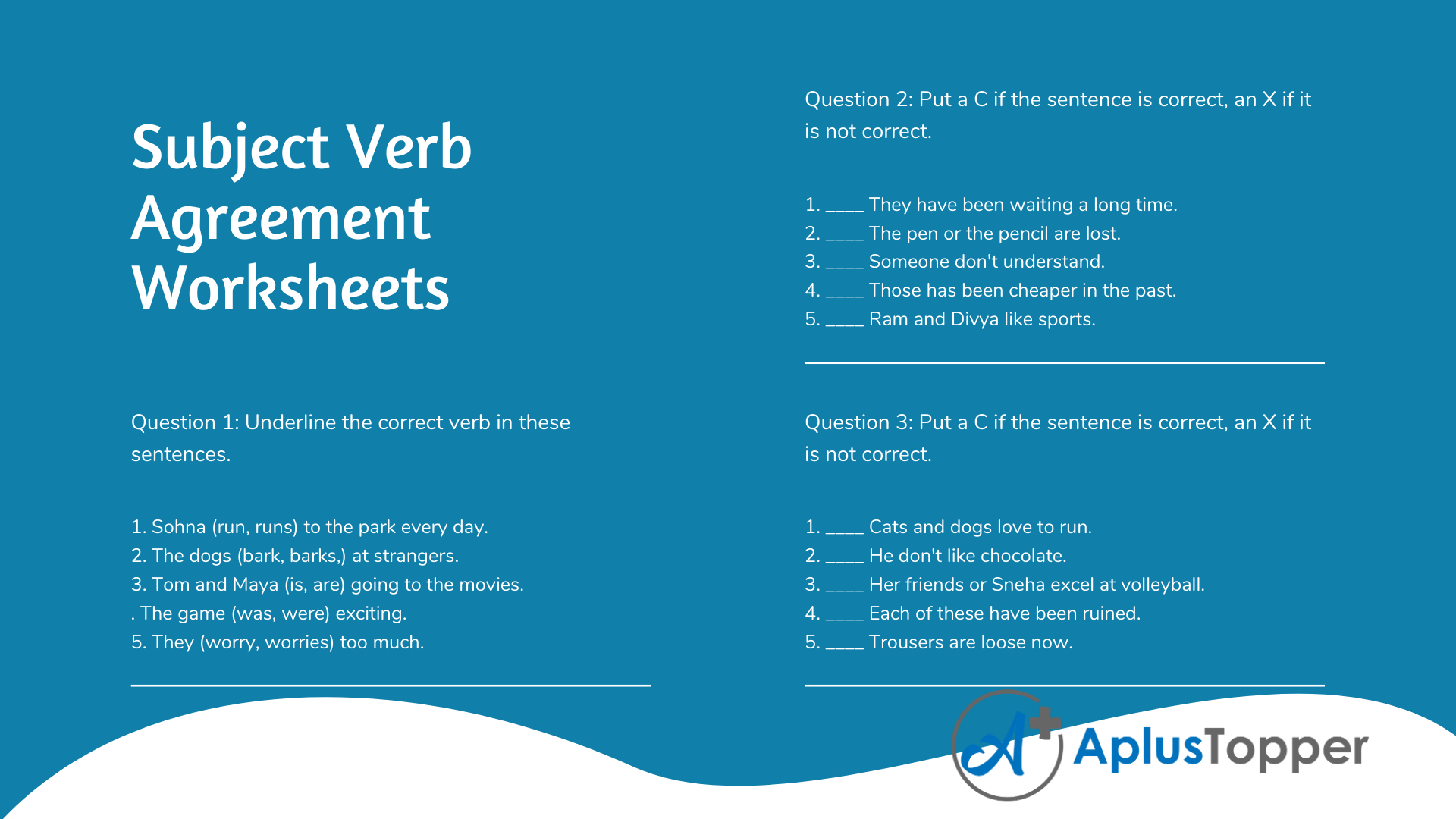Subject Verb Agreement: Being able to find the right subject and verb will help you correct errors of subject-verb agreement. For a sentence to be grammatically correct the verb has to agree with the subject in the sentence.
Looking for an easy way to Learning of English Grammar Exercises for Class 9 ICSE. You have to learn basic English Grammer topics like Tenses, Verbs, Nouns, etc… In this article, we will review the best English Grammer Topics and compare them against each other.
Subject Verb Agreement Exercises for Class 9 ICSE With Answers
Basic Rule: A singular subject (she, bear, car) takes a singular verb (is, goes, shines), whereas a plural subject takes a plural verb.
Example:
- The list of items is/are on the desk.
- If you know that list is the subject, then you will choose is for the verb.
Example:
- The items are on the table.
Here the subject, items, is plural and so the verb has to be plural.
Rule 1:
If there are two subjects in a sentence, joined by and, the verb is always plural.
Example:
Ram and Shyam are going to the market.
Exception 1:
If there are two subjects in a sentence, joined by and, but preceded by each or every, then the verb is always singular.
Example:
- Each boy and each girl is expected to do his/her duty for the country.
Exception 2:
In compound nouns joined by and, the verb is singular.
Example:
- Breaking and entering is against the law.
- The bed and breakfast was charming.
In these sentences, breaking and entering and bed and breakfast are compound nouns.
Exception 3:
When two singular nouns refer to the same person or thing, even though joined by and, the verb is singular.
Example:
- The poet and author is coming.
Note: If the article is used only once, the two nouns refer to the same person. However, if the article is used twice then the two nouns refer to two separate persons or things.
Examples:
- The poet and author is coming.
- The poet and the author are coming.

Rule 2:
A subject will come before a phrase beginning with of This is a key rule for understanding subjects. The word of is the culprit in many subject verb mistakes.
Incorrect: A bouquet of roses lend color and fragrance to the room.
Correct: A bouquet of roses lends …(bouquet lends, not roses lend)
Rule 3:
Two singular subjects connected by or, either/or, neither/nor require a singular verb.
Examples:
- My aunt or my uncle is arriving by train today. Neither Jeetu nor Raghav is available.
- Either Keya or Ravi is helping today with stage decorations.
Exception:
In an or, either/or, neither/nor sentence, if the subject is compound i.e., one subject is singular and the other is plural then the verb agrees with the noun or pronoun closest to it.
Examples:
Neither the plates nor the serving bowl goes on that shelf. Neither the serving bowl nor the plates go on that shelf.
Rule 4:
Sometimes the subject is separated from the verb by such words as along with, as well as, besides, not, etc. These words and phrases are not part of the subject. Ignore them and use a singular verb when the subject is singular.
Examples:
- The politician, along with the newsmen, is expected shortly. Excitement, as well as nervousness, is the cause of her shivering.
Rule 5:
With words that indicate portions percent, fraction, majority, some, all, etc. Rule 1 given earlier is reversed, and we are guided by the noun after of If the noun after of is singular, use a singular verb. If it is plural, use a plural verb.
Example:
- Fifty percent of the pie has disappeared. Fifty percent of the pies have disappeared.
- A third of the city is unemployed. A third of the people are unemployed. All of the pie is gone.
- All of the pies are gone.
- Some of the pie is missing.
- Some of the pies are missing.
Rule 6:
Use a singular verb with distances, periods of time, sums of money, etc., when considered as a unit.
Examples:
- Three miles is too far to walk.
- Five years is the maximum sentence for that offense.
- Ten thousand rupees is a high price to pay.
Exception:
Ten Rupees {i.e., rupee notes ) were scattered on the floor.

Rule 7:
Collective nouns, such as family, couple, staff, audience, etc., take a singular verb.
Examples:
- The staff is in a meeting.
- The bunch of keys is on the table.
Exception: When the collective noun is not used as a unit but for different individuals or things then it will take a verb in the plural.
Example:
The couple disagree with each other about disciplining their child.
The couple refers to two people who are acting as individuals.
Rule 8:
The word were replaces was in sentences that express a wish or are contrary to fact.
Example:
If Neena were here, you’d be sorry.
Neena isn’t actually here, so we say were, not was. The sentence demonstrates the subjunctive mood, which is used to express things that are hypothetical, wishful, imaginary, or factually contradictory.
Examples:
- I wish it were Friday.
In the example, a wishful statement, not a fact, is being expressed; therefore, were, which we usually think of as a plural verb, is used with the singular subject.
Rule 9:
The following words may be singular or plural, depending upon their use in a sentence: some, any, all, most.
Most of the news is good, (singular)
Most of the flowers were yellow, (plural)
All of the pizza was gone, (singular)
All of the children were late, (plural)
Rule 10:
Some nouns, while plural in form, are actually singular in meaning.
Example:
Mathematics is an easy subject for some people.
Other words in this category are:
Economics, Mumps, Measles, Rupees, News, Politics, Statistics, Civics, etc.
The indefinite pronoun, none, can be either singular or plural; it often doesn’t matter whether you use a singular or a plural verb— unless something else in the sentence determines its number. If none is taken as meaning not any we may choose a plural verb, as in “None of the engines are working,” but when something else makes us regard none as meaning not one, we want a singular verb, as in “None of the food is stale.”
- None of you takes responsibility for this incident?
- None of you take responsibility for this incident?
- None of the students have done their homework.
Subject Verb Agreement Worksheets:

Directions: Underline the correct verb in these sentences.
1. Sohna (run, runs) to the park every day.
2. The dogs (bark, barks,) at strangers.
3. Tom and Maya (is, are) going to the movies.
4. The game (was, were) exciting.
5. They (worry, worries) too much.
6. She (study, studies) every night.
7. Black or white (is, are) your choice.
8. That (was, were) incredible.
9. Those (is, are) pretty shoes.
10. The cat or dog (is, are) in the yard.
Directions: Put a C if the sentence is correct, an X if it is not correct.
1. ____ They have been waiting a long time.
2. ____ The pen or the pencil are lost.
3. ____ Someone don’t understand.
4. ____ Those has been cheaper in the past.
5. ____ Ram and Divya like sports.
6. ____ These are really special.
7. ____ You rides with me.
8. ____ All of them goes to school.
9. ____ Tina likes Mona.
10. ____ That movie was awesome.
Directions: Underline the correct verb in these sentences.
1. The girl or her sisters (watch, watches) television every day.
2. Rohan (doesn’t, don’t) like sports.
3. His classmates or the boy (study, studies) before a test.
4. One of the cookies (is, are) missing.
5. A lady with 10 dogs (live, lives) in that big house.
6. Mumps (is, are) very serious.
7. The committee (decide, decides) when to adjourn.
8. Our team (is, are) the best.
9. Everybody (enjoy, enjoys) a good song.
10. Either (is, are) suitable.
Directions: Put a C if the sentence is correct, an X if it is not correct.
1. ____ Cats and dogs love to run.
2. ____ He don’t like chocolate.
3. ____ Her friends or Sneha excel at volleyball.
4. ____ Each of these have been ruined.
5. ____ Trousers are loose now.
6. ____ The students, as well as the teacher, are nervous about the test.
7. ____ The news are on at 10.
8. ____ My family are a lot of fun.
9. ____ Mathematics is hard for many.
10. ____ The director, with all the cast members, works very hard.